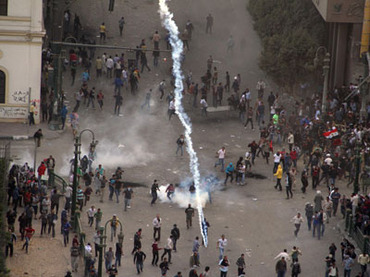
The backlash against President Mohamed Morsy’s Thursday decree was not limited to the violent scenes in downtown Cairo. Throughout Egypt’s governorates outraged protestors took to the streets and in many cities they attacked the local offices of Morsy’s Freedom and Justice Party (FJP).
Fourteen hours of destruction and fighting in Alexandria started at about 1 pm when a group of anti-Morsy protestors were confronted by Muslim Brotherhood members outside the Al-Qaed Ibrahim Mosque, just off the cornice in the heart of Alexandria.
“After about half an hour one of the protestors said, ‘there is a Freedom and Justice Party office right by here, let’s go crash it,’” recounted Mahmoud Mostafa, a Revolutionary Socialist who spent the day taking part in the protests.
At the downtown office the anti-Morsy protestors threw furniture and paperwork into the street, broke down doors and windows, and set the office on fire.
“Then one of the protestors said, ‘there is another office in Al-Ibrahimiya,’” at which point the protestors took off to destroy the second FJP office, setting it on fire as well.
The group, which Mostafa estimated to be around 1,000 people, then went to a FJP office in the Alexandria neighbourhood of Smouha. This time Muslim Brotherhood members and security forces were waiting for them.
“Once we got there, the police started arresting people. We tried to negotiate with the police, after an hour and a half the police started firing tear gas and bird shot,” said Mostafa. This was around 5 pm and clashes in Smouha continued until 3 am, with dozens of protestors being taken into custody.
On Saturday, students marched from the police station to the courthouse to show solidarity with those arrested. Hamdy Khalaf from the Egyptian Initiative for Personal Rights said he and other lawyers were waiting in the courthouse to assist the protestors who had been detained overnight.
On Friday in Suez, anti-Morsy and pro-Morsy rallies also butted heads. The two groups converged at the site of the Al-Arbaeen Police Station, which was burned to the ground on 28 January 2011, the original day of rage that served as a spark in the early days of the revolution.
The scene in Suez echoed the mood throughout Egypt on Friday, with two groups each laying claim to the revolution. The two groups in Suez chanted, one group saying they wanted an end to the Supreme Guidance of the Muslim Brotherhood, the other group advocating for supporting the president. The two sides never came to blows, with desperate calls for calm being heeded.
Suez did not escape violence though. Hassan Ghonema reported that later on Friday a group of anti-Morsy protestors beset the local office of the FJP. Police reinforcements quickly set up a defence and responded to protestors’ rocks and Molotov cocktails.
As the injuries began to mount, a makeshift hospital was set up in a cafe across the street from the FJP office. Thirteen soldiers and 40 protestors sustained injuries.
An activist in Mahalla said that the FJP office there was completely destroyed. MENA confirmed this attack, saying that Molotov cocktails were used to burn the office.
The FJP in Port Said also reported an attack on their office and released dozens of photos showing bloodied FJP members.
In Mansoura a group of angry protestors was not able to break into the FJP office. Mahmoud Nabil, a political activist from Mansoura who is currently working in Cairo but has been in touch with his peers in Mansoura, said, “the people went and tried to destroy the office but the police opposed them, so they tore down the Freedom and Justice banner that was hanging from the gates.”
In Ismailia fights took place outside the office of the FJP. Mona Yusuf Ahmed who works with Al-Dostour party in Ismailia said that Al-Dostour members worked to diffuse the situation. Even though the party is strongly opposed to Morsy’s declaration, they also do not want to see violence, Ahmed said.
Ahmed Khnfor said that he marched to the FJP office in Assiut alongside political groups and Ultras. They were confronted by members of the Muslim Brotherhood, but clashes were avoided.
In the Red Sea governorate town of Hurghada, a march to the FJP office was peaceful. “We just said we refuse the new regime,” said Mustafa Fetiyahi the local media coordinator for 6 April, “they are trying to destroy our revolution.” The protest did not meet resistance, nor did they try to storm the office. In fact one policeman helped escort the group and redirected traffic. They surrounded the office for about an hour before moving on.
Ahmed Zakaria, a leftist in Matruh, said that while Friday was calm in the western city, local political groups have been in discussions with each other about how best to go forward in expressing their discontent with Morsy’s actions.

